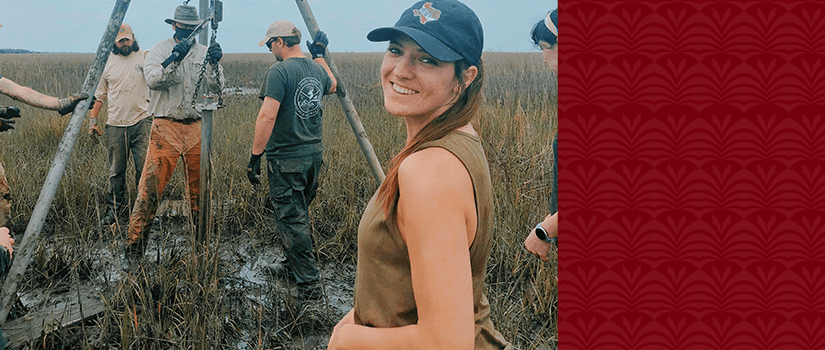Tell me about yourself. Where do you call home? What brought you to USC?
I am originally from Austin and lived in Texas my whole life before moving to Columbia for my Ph.D. in Marine Science at USC. Ironically, I didn’t always like the ocean; in fact, I was terrified of it as a child. There was too much unknown walking into it from the shore. It was powerful and the depths seemed unending.
When I was 13 my parents encouraged me to try SCUBA diving, and from there my viewpoint on the ocean flipped. There were so many colorful species of fish and vibrant corals. Each question I had led to three more. That’s when I realized I could make a career out of it. I found the position in Dr. Subrahmanyam Bulusu’s Satellite Oceanography Laboratory through a friend at USC and jumped at the opportunity to study physical oceanography in the Arctic Ocean.
What did you study as an undergraduate and where did you complete your degree?
I studied Environmental Geoscience with a marine science focus and minored in geographical
information system at Texas A&M (College Station). I did an internship with the Central
Caribbean Marine Institute conducting field work with shallow coral reef and species.
I then continued at Texas A&M with a Masters of Ocean Science and Technology where
I was introduced to coding programs and satellite oceanography data that I work with
now.
What drew you to marine science at USC?
I knew that I wanted to continue research. The topic of key environments that have
been susceptible to changes in the Earth’s climate intrigues me. That’s why I was
drawn to the opportunity to understand the Arctic Ocean’s dynamic changes in recent
decades through the Satellite Oceanography Lab.
You conducted research using satellite data to study ocean currents and salinity. Why is this work important?
Over the last few decades, there has been an increase of freshwater that has impacted the Arctic Ocean’s salinity. This, along with atmospheric pressure changes that influence ocean water pathways, can affect the circulation systems in the Arctic. If a large amount of freshwater in the Arctic is exported to the North Atlantic, there is a possibility of it affecting the processes that regulate the Earth’s climate. Through both direct (in situ) and satellite ocean model data, I have been able to get a clearer picture of how the Arctic Ocean’s dynamics have been changing during a period of rapidly melting sea ice extent.
How have you been influenced or grown from being part of the diverse culture of people, ideas and disciplines in the College of Arts and Sciences?
It has been great to be a part of the College of Arts and Sciences as well as the School of Earth, Ocean and Environment (SEOE). Aside from my research, I became a member of URGE (Unlearning Racism in Geoscience), was elected as a Marine Science Faculty member in the SEOE graduate organization and extended my efforts through outreach events. These experiences have allowed me to meet amazing people and branch out to different disciplines.
What plans do you have after graduation?
I will be moving to the D.C. area to work for Global Science and Technology (GST) as a contract scientist for the Sea Surface Salinity group at the National Oceanic and Atmospheric Administration (NOAA). Moving towards the operational science field, I will be using in situ measurements, satellite observations and ocean model simulations to increase the accuracy of our salinity retrievals.
How do you feel your academic experience in SEOE prepared you for your upcoming career?
The unending support from my instructors over the past two years has been amazing. They actively motivated me and showed compassion during my Ph.D. career, and I thank them for that. Working in the Satellite Oceanography Lab in SEOE was similar to a full-time research position and it allowed me to attain skills to use in my upcoming career. The support of the SEOE graduate students has strengthened my drive for my research further. I have met amazing collaborators in my field that not only helped me learn about Arctic Ocean science and dynamics, but the research progress in general. Without my collaborators it is hard to imagine my research advancing as quickly or becoming as well-rounded in the science community. I found my calling with GST and NOAA to continue research in my passion for the Arctic Ocean.
